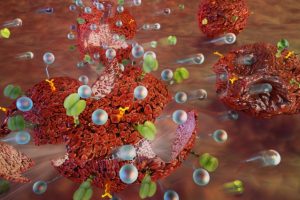Nanoparticles Create A New Horizon For Cancer Treatment
ZMR NEWS
- 0
Recently, a group of researchers from the UNIST has recently developed a new targeted drug delivery system so as to enhance the therapeutic and pharmacological properties of usual cancer treatments. The current technology has all of a sudden improved the safety and efficiency by making use of the supramolecularly formed protein corona guard as a targeting agent by changing the interfaces between biological systems and nanoparticles. The researchers Professor Sebyung Kang, Professor Ja-Hyoung Ryu, and Professor Chaekyu Kim have studied the targeted drug delivery system to transport medications to specific target tissues, cells, or organs by means of drug carriers.

To date, the drug delivery systems developed have shown minimal effects due to the thousands of protein sticking to the drug delivery system. After all the sticking, when the drug reaches its targeted cancer cell the efficacy of the drug is reduced plus the side effects are enhanced which may cause other toxic effects. The effect of protein corona on to the target drug delivery can be reduced by developing a protective shield made using well-structured, stable special proteins that generally do not react with one another. The new technology basically focuses on taking control over most of the delivery techniques. The protein corona shield (PCS) for the targeted drug delivery system has been created using recombinant DNA technology wherein the recombinant fusion proteins with great physical stability and cancer-selective ability were developed. The fusion proteins were coated on the exterior of nanoparticle drug carriers for constructing PCS nanoparticles (PCSNs).
The new delivery system can eliminate the blood protein adsorption so as to maintain the target ability plus shun the mononuclear phagocyte system clearance. The researchers have created an exact replica of the human biological systems so as to study the interactions between PCSNs and inner body components using computer simulation analysis. The new delivery system could slay more cancer cells without being wedged by the immune cells. The treatment of various diseases and heat-optical therapy can also use this technology. Bioengineers from Vanderbilt University today have made a groundbreaking invention by developing a technique wherein penetrating the cells within tumors and switching them to start fighting is possible.
